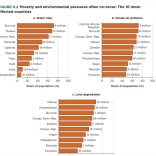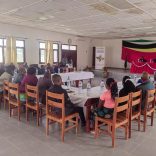Mozambique begins countrywide elephant aerial survey, seven years after last count
“National Parks as a motor of human development” – Nyusi receives award from Conservation Foundation
Noticias / From left to right; Greg Carr, from the Carr Foundation / Gorongosa National Park; ICCF president John Gantt and President of Mozambique Filipe Jacinto Nyusi
The International Conservation Caucus Foundation (ICCF) announced in Washington on Thursday that it has awarded Mozambican President Filipe Nyusi its “Award of Merit in Conservation”.
Cited in a press release issued by Mozambique’s flagship conservation area, the Gorongosa National Park, ICCF President John Gantt said “President Nyusi has won this award for promoting a new concept of a national park in his country – the national park as a motor of human development”.
“It is no secret that wild life in Mozambique suffers from poaching”, said Gantt. “President Nyusi has committed his country to ensuring the best protection to its 13 national parks and reserves, while it simultaneously promotes a new approach to rural development: using the parks and reserves of Mozambique as engines of education, economic development and provision of services for the traditional communities who share ecosystems with these natural treasures”.
“In the past”, Gantt continued, “some people believed that the conservation of nature and human development were goals that competed against each other. Now visionary leaders such as President Nyusi recognise that sustainable economic growth is intimately linked to a healthy environment – and that human beings and natural economies are interdependent”.
Gantt added that “Mozambique will be less Mozambique if we gaze passively at the illegal destruction of forests and wild life”.
On receiving the award, Nyusi thanked the ICCF and praised it for the work it is doing in the Gorongosa Park, which is jointly managed by the Mozambican government and the US Carr Foundation.
Nyusi said that Gorongosa is an example of a conservation area which protects biodiversity, while helping the communities which surround it. The joint management agreement for Gorongosa covers the 400,000 hectares of the park itself plus a buffer zone of about 600,000 hectares adjacent to the park, where about 175,000 people live.
Over the past ten years the number of large wild animals in Gorongosa has risen from 10,000 to around 71,000. The park has created jobs in tourism, and established a biodiversity laboratory which is deepening the country’s knowledge of its ecosystems and is training young Mozambicans to become scientists.
In the buffer zone, known as the human development area, the Gorongosa Park has implemented education, health and sustainable agriculture programmes. Last year, about 114,000 people benefitted from the park’s health services.
At the Washington ceremony, Greg Carr, of the Carr Foundation, and a member of the Park’s Supervisory Commission, expressed his satisfaction at the Mozambican government’s decision, announced last week, to extend the Gorongosa joint management agreement for a further 25 years. He also took the opportunity to announce a new girls’ education programme, drawn up with the support of the Mozambican Education Ministry, for the 93 primary schools that are neighbours of the park.
In the “Girls’ Clubs” financed by the Park, after school hours the girls will be able to concentrate on reading, on studying natural sciences (including visits to the park), on recreational activities, and on learning about personal safety, health, nutrition and family planning. The purpose of the Girls’ Clubs is to help the girls complete their secondary education successfully, provide them with professional training, and reduce the high prevalence of child marriage and early pregnancies in these rural areas.
The stated mission of the ICCF is “to advance U.S. leadership in international conservation through public and private partnerships and to develop the next generation of conservation leaders in the U.S. Congress”.
The ICCF website states that it “brings together leaders at the highest level of government, business, and the NGO community. We set the conservation and environmental agenda by coordinating people with scientific expertise, organizations that support and manage programs on the ground, and policymakers who shape legislation”.












Leave a Reply
Be the First to Comment!
You must be logged in to post a comment.
You must be logged in to post a comment.